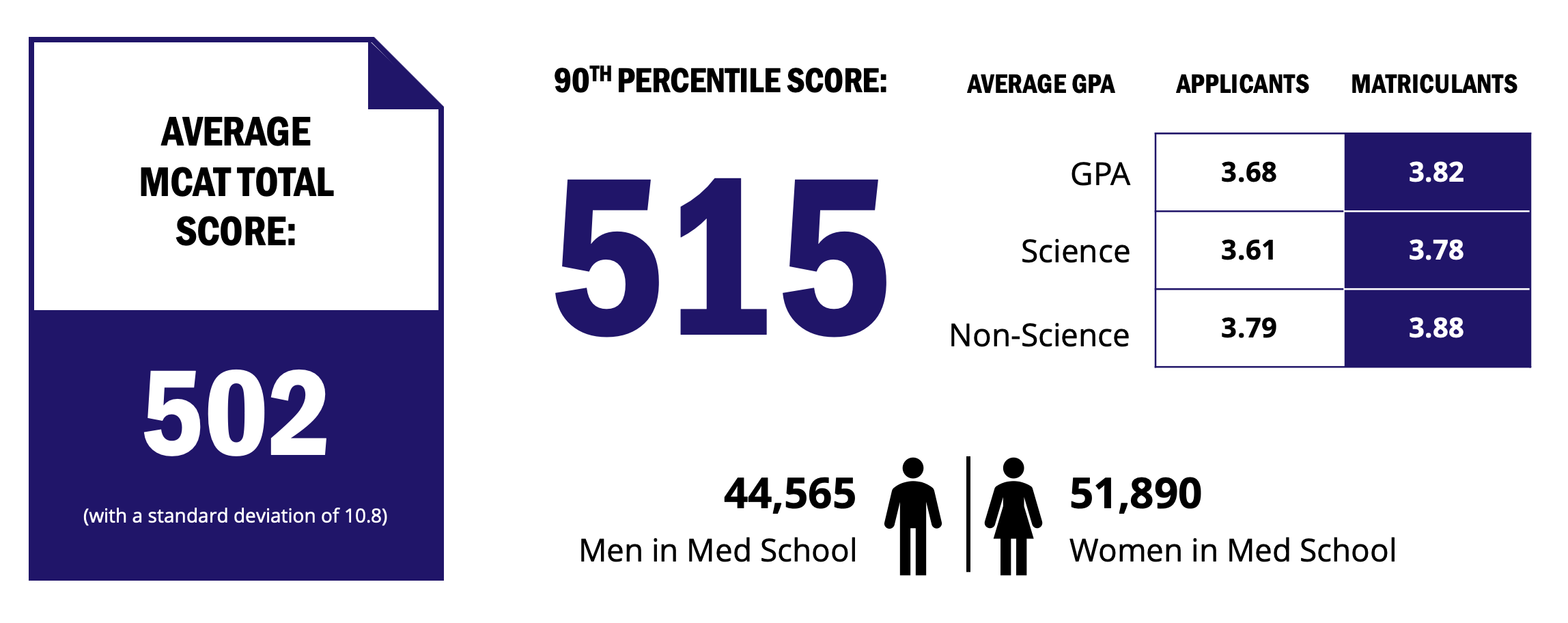
A good MCAT score is generally considered to be 511 or higher, with no section score below 127. The MCAT, also known as the Medical College Admission Test, is a computer-based standardized exam designed to assess your potential as a medical student and doctor. Earning a good MCAT score is crucial to gaining acceptance into a top medical school. There is no set passing score on the MCAT; therefore, understanding the different MCAT score ranges and which percentile you’ve scored in will help you set realistic goals. This article breaks down the MCAT score ranges so you can see what a good MCAT score looks like and how it might impact your admittance into medical school.
[ RELATED: 2022 MCAT Test Dates and Score Releases ]
TABLE OF CONTENTS
How is the MCAT scored?
Your MCAT score is based on the number of questions you answer correctly. The MCAT is not graded on a curve; rather, it is scaled and equated so that scores have the same meaning no matter when you take the exam. Furthermore, there is no penalty for wrong answers, so it’s important to answer all questions on the MCAT to maximize your score, even if you have to take an educated guess.
This is how the MCAT is scored by the Association of American Medical Colleges (AAMC):
- The AAMC counts the number of questions you answered correctly in each of the four sections. There is no penalty for wrong or unanswered questions.
- The AAMC converts the number of correct questions you answered into scaled scores for each of the four sections.
- The AAMC adds the scaled scores from each section to calculate your total scaled MCAT score, ranging from 472 (lowest) to 528 (highest).
Ultimately, you will receive five scores for your MCAT exam: one scaled score for each of the four sections and one combined total scaled score.
[Read Next: What’s Tested on the MCAT?]
About MCAT Score Ranges
Each of the four sections of the MCAT is scored between 118 and 132, with the mean and median at 125. The total MCAT score range is between 472 to 528, with the mean and median at 502. Why such odd numbers? According to the AAMC, this scale emphasizes the importance of the central portion of the score distribution, where most students score (around 125 per section, or 502 total), rather than putting an undue focus on the high end of the scale.
What is the Highest Score You Can Receive on the MCAT?
The highest MCAT score you can receive is 528. While test designers make it difficult, it is possible to achieve a so-called “perfect score” on the MCAT. According to the AAMC, out of the approximately two hundred thousand students who take the exam each year, between 30 and 70 achieve the highest score of 528 on the MCAT. See below for the correlation between scaled MCAT score and percentile.
MCAT Score Ranges by Scoring Percentiles
MCAT Score Breakdown by Section
MCAT sections are scored between 118 and 132. Below, we break down each MCAT section score by best, competitive, average, and below average
Best MCAT Total Score Range: 515-528
Competitive MCAT Total Score Range: 509-514
- Chemical and Physical Foundations of Biological Systems: 127-128
- Critical Analysis and Reading Skills: 127-128
- Biological and Biochemical Foundations of Living Systems: 127-128
- Psychological, Social, and Biological Foundations of Behavior: 128-129
Above Average MCAT Total Score Range: 502-508
- Chemical and Physical Foundations of Biological Systems: 125-126
- Critical Analysis and Reading Skills: 125-126
- Biological and Biochemical Foundations of Living Systems: 125-126
- Psychological, Social, and Biological Foundations of Behavior: 126
Below Average MCAT Total Score Range: 501 or below
- Chemical and Physical Foundations of Biological Systems: 124 or below
- Critical Analysis and Reading Skills: 124 or below
- Biological and Biochemical Foundations of Living Systems: 124 or below
- Psychological, Social, and Biological Foundations of Behavior: 125 or below
Is 520 a good MCAT score?
An MCAT score of 520 is very strong and puts you in the 97th percentile of all MCAT test takers. However, whether or not a score of 520 on the MCAT is enough to get you into medical school depends on which schools you are applying to and your other qualifications. Another factor to consider is that while a 520 on the MCAT is generally considered a good score, top medical schools prefer an even distribution for section scores. You may want to retake the MCAT if one of your section scores is significantly lower than the others to be a more competitive applicant.
How do you get a good MCAT score?
Earning a good MCAT score may seem like a daunting task. One of the most important things you can do to set yourself up for success on the MCAT is to begin your studies early and take advantage of study materials and resources designed to enhance your studies. Below, we list some MCAT test prep resources we recommend you use to maximize your score.
[Keep Reading]: Top 10 MCAT Study Tips
MCAT Test Prep Resources
- Free MCAT Practice Test (with practice bundle): Establish a baseline for your MCAT studies by taking a realistic practice test. After signing up, you’ll also receive 30-day access to our new study planning calendar, a Qbank with 230 questions, and learning modules.
- Free Study Plans for the MCAT: Plan out your MCAT studies with our expertly curated MCAT study plans. Choose from our 6-month MCAT study plan, 3-month MCAT study plan, 2-month MCAT study plan, or 1-month MCAT study plan, depending on your exam date.
- MCAT Question of the Day: Jumpstart your studies with an MCAT question – and detailed answer explanations – in your inbox every day.
- MCAT Test Dates & Registration: Schedule your MCAT by reviewing a list of all upcoming test dates, registering for the exam, and keeping an eye on score release dates so you know when to expect your score.
- Kaplan MCAT Prep Courses: Get personalized MCAT prep from Kaplan experts. We’ll show you how to add 15 points to your MCAT score.* From live online courses to private tutoring, we have the right test prep option for you and your study goals.
What MCAT Score Do You Need for Top Medical Schools?
What MCAT score you need to get into top medical school depends on various factors. When considering your MCAT score goal, it’s always a good idea to look at the requirements or minimums (if any) at the schools to which you’re applying. But while what is considered a good MCAT score differs from program to program, Kaplan Test Prep research shows that not doing well on the exam is the admissions factor most likely to keep you out of medical school.
According to the 59 medical schools we spoke with in 2021, 38 percent said a low MCAT score is “the biggest application dealbreaker” in the primary application; a low undergraduate GPA was a close second at 36 percent.
In the table below, we list the average MCAT scores for top medical schools across the U.S.
How Long are MCAT Scores Valid?
According to the AAMC, medical schools generally accept MCAT scores that date back two to three years at most. If you have an MCAT score that’s older than three years, the AAMC will keep a record of it in their database. However, an MCAT score older than three years will not be valid for medical school applications as schools will want to see applicants prove up-to-date medical knowledge by taking a more recent MCAT. Consult the Medical School Admission Requirements™ (MSAR®) to check the application policies of the schools to which you intend to apply to ensure your MCAT scores are valid.
The average MCAT total score is 502 with a standard deviation of 10.8, while the 90th percentile score is 515. As of 2023, there are 44,565 men and 51,890 women in medical school according to the AAMC. In the graphic below, we highlight some important MCAT score statistics.

Many factors affect your med school application, and each will help decide whether you’re admitted or rejected. Your MCAT score is just one part of your candidacy. Your undergraduate GPA, letters of recommendation, research, interviews, and personal essays will all contribute to your acceptance into your dream school.
View MCAT Scores and Percentiles
| MCAT Total Score | MCAT Percentile Rank |
|---|---|
| 524-528 | 100 |
| 522-523 | 99 |
| 521 | 98 |
| 520 | 97 |
| 519 | 96 |
| 518 | 95 |
| 517 | 94 |
| 516 | 92 |
| 515 | 90 |
| 514 | 88 |
| 513 | 86 |
| 512 | 83 |
| 511 | 80 |
| 510 | 77 |
| 509 | 74 |
| 508 | 71 |
| 507 | 68 |
| 506 | 65 |
| 505 | 61 |
| 504 | 58 |
| 503 | 55 |
| 502 | 51 |
| 501 | 48 |
| 500 | 45 |
| 499 | 41 |
| 498 | 38 |
| 497 | 35 |
| 496 | 32 |
| 495 | 29 |
| 494 | 26 |
| 493 | 24 |
| 492 | 21 |
| 491 | 19 |
| 490 | 17 |
| 489 | 15 |
| 488 | 13 |
| 487 | 11 |
| 486 | 10 |
| 485 | 8 |
| 484 | 7 |
| 483 | 6 |
| 482 | 5 |
| 481 | 4 |
| 480 | 3 |
| 478-479 | 2 |
| 476-477 | 1 |
| 472-475 | <1 |
Kaplan is the official MCAT® prep of the American Medical Student Association.

*15 point average only applied to students who completed 6,000+ practice questions and 600+ study activities during their program. A recent study conducted by Kaplan showed that students who completed a minimum of this work saw an average score improvement of 15 points from their first to their highest practice exam. Students who started with lower scores saw greater increases. Students who completed fewer practice questions, study activities, or who did not engage in the full program, saw lower score increases. Learn More.

